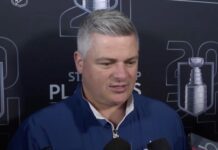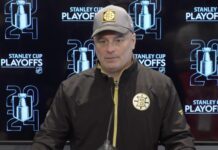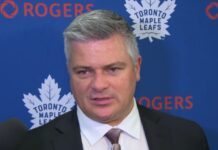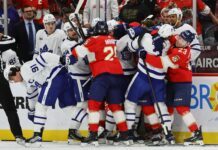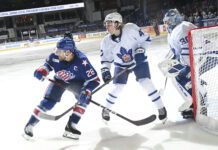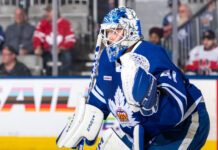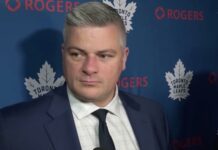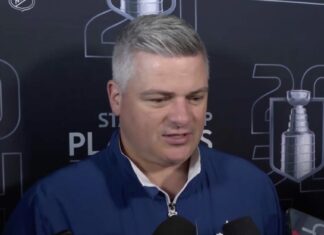Toronto Maple Leafs head coach, Mike Babcock, addressed the media at his end-of-year availability discussing: Auston Matthews’ ice time, his relationship with Kyle Dubas, how William Nylander can bounce back from an off year, and the organization’s plan for improvement going forward.
Going forward now, Nazem Kadri sits in your office and says, “You can trust me.” How do you do that given what has happened in the last two years?
Babcock: I don’t know how long it has been since he has been suspended, but this last while for Naz has been tough. You sit there and you watch your teammates go to battle and you know you might be the tilt in the series and the depth we were counting on. You didn’t intend to cross the line. You were trying to stand up for a teammate, but it went bad on you. I think what impacts it more is back-to-back years. So it… It is hard.
As the exit interviews progress this morning, what was the common theme? How fine a line was the disappointment and optimism?
Babcock: Well, I mean there are eight teams playing and we wanted to be one of them. There are 23 of us at home. Some of us are more disappointed than others. Since I’ve been here, I think this is the most disappointed our group has ever been. We felt like this was an opportunity.
Now, we played a good, good Boston team. We are not taking away anything from Boston, but there is pain in growing your group. This is the part where you are just trying to crawl in over the edge. This is where we are at.
Our guys really like each other. We’ve got a really good group. We’ve got the best group we’ve had. We had a lot of guys who had real good years and played hard for another. We wanted to hang around a long time. You know in this business there is going to be change, so that makes it hard. We believe as a group — as a management team and Shanny and Duby and myself — that we are right there. Now, we’ve got to continue to build and add depth and add players.
Our players believe the same thing. Our meetings today, individually, the feedback from our players has been outstanding with that. They like being here. They like our opportunity. But we’ve got to do something. We are one of 23 teams sitting here.
Is there anything you wish you did individually to influence a better result?
Babcock: There are always things. It is interesting. There are 23 coaches today sitting at home thinking they should’ve done something different. We knew who we were playing and we really prepared. We started this series. They adjusted. We adjusted back. When I look back at the series, Game 2 and Game 6, for us, were our weakest games. Game 6, we started so well and then we froze there for about 30 minutes in the middle. You can look at Game 7 all you want, but that one there to me was a slipped opportunity.
Game 7, I thought we started really well. I thought we played pretty good until the score was 3-1, to be honest with you. The puck went in our net and didn’t go in their net. But we were organized as a group. The toughest games for us were 2 and 6.
What does William Nylander have to do this summer and can he use those two months of the season he missed as an excuse or does he just need to be better?
Babcock: I don’t know how much you have tried excuses in your life, but they are a waste of time for yourself and a waste of time for everyone else. Willy is not like that. What does Willy need to do? He needs to get out of here. He needs to get back to being Willy and being confident and feeling good about himself, and getting away in training. When you are an athlete and you’ve held out like Willy did and you come back and it didn’t go the way…. Willy is a proud guy. He is a great kid. He has a chance to be a real good player. He wasn’t a good player. No one wears that more than Willy and he’d be honest about that.
So he needs to get out of here, he needs to get home, he needs to get recharged, and he needs to get training and get his game back on track and get his swagger back. No athlete who has any success is any good without having that swagger back. It is a huge summer for Willy because we need him to be a factor.
Do you still see him at the center spot?
Babcock: It all depends on your lineup, right? If Naz was available, we woudn’t have had to play Willy and we would’ve had more options. But Naz wasn’t available. It’s the way it goes. To me, if he can play on the wall for us, we’d like that.
What did Zach Hyman go through pain-wise in the last few games and how tough is that? Does it already make you look at next year with him missing camp?
Babcock: When he got hurt there, I think it was three games before the end. Obviously, it affected our team. He does the work for that line. He goes to get the puck all the time. He is the guy on that face-off circle. He couldn’t put weight on his leg. On the penalty kill, it affected his penalty killing. What I like about Hyms is that he doesn’t say nothing. He actually told us at one time, “I think I am getting better.” In other words, in his heart and in his mind, he was playing hockey for the Maple Leafs and he was going to play hard and do everything he could.
The other thing about Hyms, and I know there are timelines on everything — he is usually ready way before the timeline is. I wouldn’t… We’ll see how it goes.
What has your conversation with Kyle been like since the defeat and what do you need to do this offseason?
Babcock: We’ve had a number of conversations. We had a good one. We met for a couple of hours this morning just talking about our plan moving ahead and what we have to do as a management team to make sure we get where we want. When you have year-end meetings with the players, you’re talking about getting stronger and working on the skills and doing all this. You have an obligation as a management team to do a lot of work yourself to improve yourself as a coach, as a manager, but also to improve the team within the salary structure and help the guys to get where we want to go. That is going to be our focus. That conversation is going to go on for quite a bit here. We’ll try to get ourselves set up to improve our hockey club.
The hardest thing to do is win in the playoffs. Since you’ve been in Toronto, the team has not been able to make it to the second round. How do you deal with that sort of pressure in a summer that is longer than you hoped?
Babcock: Two years ago when we made it, we probably shouldn’t have made it. We had a run and didn’t expect to. Last year, we were a legitimate playoff team. This year, it felt like we were a real hockey club. We had significant pieces leave last year in van Riemsdyk and Bozak. Polie and Leo were real good penalty killers for us. Mac. Those are good pieces, but we brought in Muzzin and Tavares. Tavares, for me, gave us someone who could play against anyone. It gave us an example, gave us an everyday pro who does it right every day. He’s an unbelievable teammate and a great man who helps people get better. Muzz gave us another guy who can play. We think we are going in the right direction. We’ve still got to add depth to our lineup. Part of that is us developing more depth, part of it is our scouts finding more people and us signing more people. We need more. We just keep working away at it.
There are 23 teams sitting at home. What we have seen is that the league is very tight and there is lots fo disappointment. But your job is to knock on the door, knock on the door, knock on the door. Eventually, they’ll open the door. We are in a much better situation than we have been in any year prior to this.
Where did you see the biggest area of growth for Mitch Marner this season?
Babcock: He is a guy who plays in all situations. He played basically the whole year against the number-one lines on the other team. He has improved drastically defensively on the penalty kill. There are things Mitch can still do to get to the next level. Mitch is going to be a real leader on our club. We need him and Auston to take a step in that area for sure. We think they are very capable of doing that. But they are also third-year players. They are just going to get better and better. The challenge is for them to do that. The work they do in the offseason — on their strength, on their shot, on their things to get better — are very important for us.
You addressed this late in the season, but when there is a disappointing loss like this, there is a lot of speculation on the outside. Can you clarify to all of the people doing the speculating what your relationship is with Kyle right now?
Babcock: Well, it is really good. But I thank the media in our town because the reason we have the fan base and the support we do is because of you people. The reason you have jobs is because we have this big community that loves hockey so much. You get paid to do this stuff. Have at her. But what we are going to do — the people that are running the hockey team — is make the decisions and run the hockey club. We are going to know what our relationship is because we have it every day and we are not going to let anybody get in between that. Duby is a smart guy, a good guy. I’ve worked with him and he was here when I got hired. I worked with him and Shanny now for four years here and I’ve enjoyed it and continue to enjoy it.
Like all hockey players, Auston has said that he is up for more ice time. Any consideration into giving him more in the future?
Babcock: I never really thought about it. I don’t know what his minutes averaged out in the playoffs — I haven’t looked at it — but I think he played just about 20 a night in the playoffs, if I am not mistaken. It is probably a little bit too much for the regular season. Part of it is shift length. It also depends on how many centers you have. Also depends on how often you are winning. When we win, they play less. When we lose, they play more because we are chasing the game. But the biggest thing about him is he is really improving as a player in his 200-foot game. He is having a bigger impact. He had a much better playoff this year than he did last year and he is an important piece for us. Just like we talked about with Mitch and all of our guys, they’ve got to continue to grow for us to get where we want to go.


